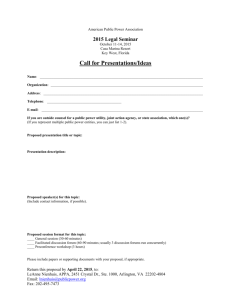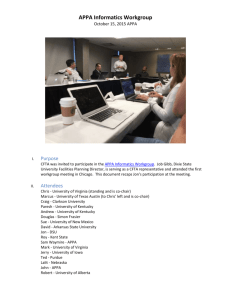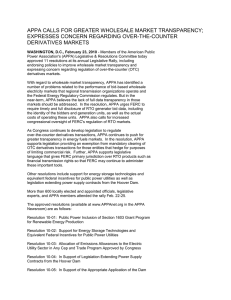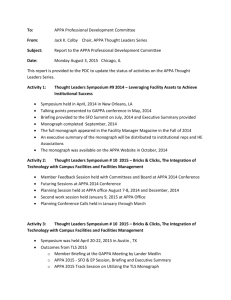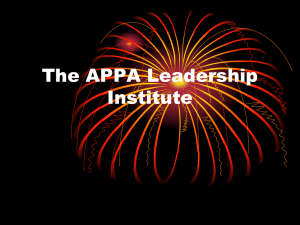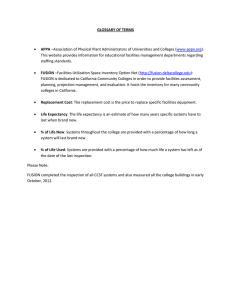Progress Report on Standards and Codes Development for
advertisement
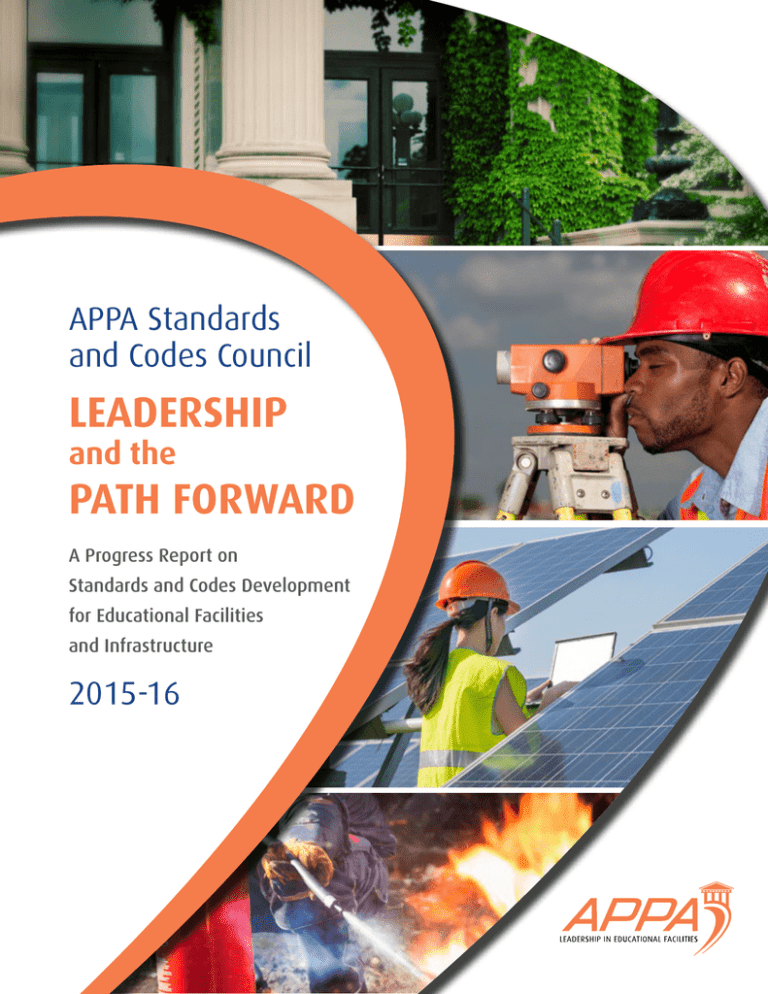
APPA Standards and Codes Council LEADERSHIP and the PATH FORWARD A Progress Report on Standards and Codes Development for Educational Facilities and Infrastructure 2015-16 April 2016 Dear Colleague, The APPA Standards and Codes Council is pleased to share with you its 2015-16 Progress Report on Standards and Codes Development for Educational Facilities and Infrastructure. For more than a century, APPA has successfully served as the gathering place for educational facilities professionals to share information, network, and advance our institutional mission. It is one of APPA’s core beliefs that higher performing facilities are an enhancement to learning and integral to the ability of an educational institution to achieve its mission. The APPA Standards and Codes Council (ASCC) was initially established out of a need to educate our membership about codes and standards, and in turn advise the code and standards-development community of the needs of educational institutions. The respondents to APPA’s most recent APPA Member Survey ranked codes and standards activities among the top programs and services provided by APPA, with 83 percent rating standards compliance as an extremely important or important area for future services supplied by our association. Since the Council’s creation in 2012, APPA has built strong relationships within the standards community to ensure the needs of education institutions are communicated, particularly in the areas of fire and life safety systems, construction, campus security systems, energy efficiency, and sustainability. The ASCC is strategic in its approach and is now the proactive voice for educational facilities in the standards and codes development arena. We wish to promote costeffective, efficient and pragmatic solutions that strengthen our facilities and campuses as a whole. In April 2015, and under the ASCC’s direction, APPA received approval by the American National Standards Institute (ANSI) to become an ANSI Standards Developer. This is a significant milestone for APPA, as it is the only membership-based organization of facilities professionals – and the only facilities membership organization within the education sector – that holds the ANSI accreditation. Last November, APPA announced its intention to develop ANSI standards that support the application of Total Cost of Ownership (TCO) principles and practices to facilities and infrastructure. With the formation of the APPA TCO Work Group, we have now begun work this spring on our first standard, APPA 1000, Total Cost of Ownership for Facilities Asset Management. It is our intention that APPA 1000 will enable owners of facilities assets in education and other sectors to implement standardized TCO principles and practices within their building and infrastructure portfolio from “cradle to grave.” APPA 1000 will serve as a much needed blueprint for facilities owners to more effectively execute strategic cost planning and decision-making at every stage of a building through its lifecycle. It is our hope this progress report will educate you about the standards work that the ASCC is successfully accomplishing on behalf of education. If you have any questions, please contact us. Sincerely, Brooks Baker, III, Chair APPA Standards & Codes Council 2 | APPA Standards and Codes Mission and Purpose Established by the APPA Board of Directors in 2012, the APPA Standards and Codes Council (ASCC) monitors standards and code activities among national and international standards-setting organizations impacting education; educates APPA member institutions on standards compliance; and influences the development and creation of standards and codes to ensure that the interests of educational institutions are realized in the standards-setting process. APPA Standards and Codes Council MISSION STATEMENT • Promote codes and standards AWARENESS and EDUCATION among members. • Determine the IMPACT of existing and proposed standards and codes on educational institutions. • INFLUENCE standards and code development process and outcomes. • Set parameters and display APPA’s LEADERSHIP on standards and codes and seek pragmatic solutions to the needs and requirements of educational institutions. • Identify broad CONSENSUS among APPA’s institutional members and seek appropriate representation in standards bodies at local, state, national, and international levels. The Influence of Standards and Codes APPA’s membership is comprised of over 15,000 educational facilities professionals from more than 1,300 APPA member learning institutions throughout the United States, Canada, and Mexico. The results of APPA’s 2014 membership survey ranked standards, codes, and compliance among the top ten most important services and programs made available through APPA. Eighty-three percent of the survey respondents ranked codes and standards as either an extremely important or important component of future APPA programming and services. The impact of national and international standards and codes development bodies is significant to educational facilities and infrastructure, and that impact is growing. This is readily apparent, as standards development organizations increasingly turn their attention to pressing issues facing the education sector. These issues include school security, and the growing frequency of active shooting incidents; emergency preparedness; energy management; “green” building construction and maintenance; sustainability practices; and more. Standards and codes impact every facet of campus facilities, including planning, design, and construction; energy and utilities management; operations and maintenance; and renovation. These standards, or portions thereof, are often adopted at the state and municipal levels, resulting in codes compliance obligations — some unnecessarily costly, others less so — for educational institutions and their facilities and infrastructure. At a time when educational institutions are facing the continuing reality of reduced funding, increased tuition rates, and rising operating costs, it is critical for APPA International to engage and align efforts with other national and international membership organizations and peer standards development organizations within the facilities and infrastructure communities. This ensures that the collective voice and unique needs and interests of educational institutions are heard and properly vetted as part of the standards and codes decision-making and development process. Leadership and the Path Forward | 3 APPA Standards and Codes Council Chair Brooks Baker, III APPA Past President University of Alabama at Birmingham (retired) Richard J. Davis The Evergreen State College David Handwork Arkansas State University Clint Lord Arizona State University Dana Peterson University of New Hampshire Staff Liaisons Alan Sactor University of Maryland, College Park Theodore Weidner Purdue University John Bernhards Associate Vice President APPA International Sam Waymire Codes Administrator APPA International Billie Zidek Codes Administrator APPA International One Voice, from Many Engaging the education sector in standards and codes activities requires a consensus-based process that is impartial and brings together a diverse range of stakeholders and subject matter experts. The APPA Standards and Codes Council establishes Work Groups to develop APPA standards and to make recommendations and propose changes to codes and standards established and maintained by other standards development organizations. The ASCC works on behalf of APPA’s members to ensure the needs of educational institutions are heard by the International Code Council (ICC), the National Fire Protection Association (NFPA), and other standards developers on an as needed basis. When developing APPA standards, the ASCC Work Groups utilize established procedures to maintain and manage their Work Group activities. As an Accredited Standards Developer, APPA uses Accredited Procedures for the Development of American National Standards, approved by the American National Standards Institute (ANSI), when engaged in ANSI standards development activities. Consulting Services to the APPA Standards and Codes Council Bill Koffel, president of Koffel & Associates, is an independent consultant and advisor to the ASCC on emerging and current standards and codes issues impacting the educational facilities sector. Koffel & Bill Koffel Associates is a fire protection and life safety engineering design and consulting firm, and is widely recognized for its expertise in the fire protection and life safety aspects of codes and standards. Mr. Koffel is active in the development process of the industry’s governing codes, standards, and design guidelines including those undertaken by the International Code Council (ICC) and the National Fire Protection Association (NFPA), the Society of Fire Protection Engineers (SFPE) and Underwriters Laboratories (UL). A former code official with the Maryland State Fire Marshal’s Office, he is a past president of the SFPE. APPA International is an ANSI Accredited Standards Developer 4 | APPA Standards and Codes Leadership & Collaboration The ASCC collaborates with leading standards bodies to represent the concerns of educational facilities. School and Campus Security At the invitation of the National Fire Protection Association (NFPA), representatives of the ASCC participated in the NFPA School Safety, Codes, and Security Workshop, held December 2014 at the University of Maryland’s College Park campus. More than 60 NFPA fire and life safety professionals, campus and school public safety officials, and representatives from national and international standards setting bodies and public interest groups were present for the event. The findings of the workshop are posted on the NFPA web site at www.nfpa.org. Among the key observations and areas of discussion among stakeholders at the December NFPA Workshop were the following: Multiple Hazard Planning Concepts in Schools: Approximately 70 percent of school campus fires take place within K-12 school buildings while approximately twelve percent occur on college and university campuses. When it comes to school life safety however, many schools and campuses are now implementing not only fire drills, but lockdown drills as well. Additionally, where schools are prone to natural disasters and related risks, there is a growing mandate for “shakeout” or earthquake drills, not to mention flood drills. Some jurisdictions are paring back the frequency of fire drills as required under NFPA 101 to accommodate these other drill requirements. The workshop revealed that there is growing concern that different and multiple drill procedures may lead to confusion among students and other occupants and therefore compromise safety in the event of an actual emergency. Locking Hardware: A growing concern among fire and life safety professionals is the increasing number of “lockdown” door locking mechanisms and systems that are entering the marketplace and which fail to meet egress compliance requirements, or may be unintentionally designed to obstruct such requirements. Workshop participants identified the need to ensure that innovations and new approaches to locking hardware are encouraged but thoroughly evaluated to ensure fire and life safety is not compromised. This issue is now an area of key focus for NFPA Technical Committees. Leadership and the Path Forward | 5 Leadership & Collaboration Fire Alarm Activation and Delayed Response: Another area of concern is whether allowances should be made within current fire and life safety codes to support delayed response for evacuation, in the event a school building fire alarm is pulled or activated. The argument for allowing “delayed response” is that it would enable public safety personnel on school property to substantiate that a fire or related conditions exist, and to do so prior to sounding the audible alarm and evacuating occupants from the school building. This topic is of great debate among fire and life safety officials and security professionals – and deservedly so. Tools, Procedures and Resources Required of First Responders When Facing an Armed Intruder Situation: The workshop sought to identify the basic building/fire code provisions that must be understood by first responders, as well as first responder protocols that must be understood by fire and life safety codes and standards developers. There was consensus among participants that greater clarity and adoption of general procedures were needed with regard to responder communications technologies, school building entry and access, and student evacuation safe areas, among other considerations. ASIS International/NFPA Active Shooter Stakeholder Meeting As a follow-up to the December 2014 NFPA School Security Workshop, APPA staff represented the ASCC at the ASIS International and NFPA Active Shooter stakeholder meeting in January 2016. The stakeholder meeting brought together representatives of more than 50 industry groups; standards development organizations; and members of the law enforcement, fire, EMS, government, and academic communities for the purpose of considering “what and where are the existing resources to address active shooters,” and to examine “the crossover between security and fire safety discipline intersections.” Breakout sessions addressed the topics of: 6 | APPA Standards and Codes • The budgetary constraints of implementing policies relating to “active shooter” preparedness and awareness; • The role of management and leadership; • The role of technology solutions; and • Key players and different roles of the public and private sectors. A next step by organizers may be to compile a “road map” of existing documented procedures and policies, in order to deliver a suite of best practices in a unified format. Participants also agreed that any solutions developed as a part of this activity represent a unified approach between the public and private sectors, avoiding informational silos if at all possible. Addressing Fire Sprinkler Safety On July 12, 2015, firefighters in Oviedo, Florida, responded to a sweeping three-alarm fire at the Tivoli Apartments, a privately-owned off-campus residential complex adjacent to the University of Central Florida. The Tivoli Fire has become, in recent months, a focal point for discussion among sprinkler manufacturers, the insurance industry, fire and life safety personnel, APPA, and other stakeholders who are now evaluating the overall effectiveness of the NFPA 13 sprinkler system installation standards. At NFPA’s invitation, APPA represented the education facilities sector in a two-day Sprinkler System Workshop held December 14-16, 2015, in Orlando, Florida. More than 70 subject matter experts, NFPA 13 committee leaders, and other stakeholders were in attendance for the event to offer observations and recommendations for improvement to the 2016 editions of NFPA 13, Standard for the Installation of Sprinkler Systems, and NFPA 13R, Standard for the Installation of Sprinkler Systems in Lowrise Residential Occupancies. The findings of the Workshop will be published by NFPA in early summer 2016 and be considered for comment and potential incorporation in edits in the 2019 edition of NFPA 13/13R. Leadership & Collaboration ANSI: The American National Standards Institute The ASCC coordinates APPA’s representation and participation within ANSI, a non-profit membership organization that oversees the development of voluntary consensus standards for products, services, processes, systems, and personnel in the United States. APPA is a full voting organizational member of ANSI and participates as a stakeholder in the development and review of standards relevant to educational facilities. It is also an active participant in the ANSI Organizational Member Forum (OMF). APPA and the Center for Campus Fire Safety Through the efforts of the ASCC, APPA and the Center for www.campusfiresafety.org Campus Fire Safety (CCFS), a US-based member organization of fire and life safety professionals in higher education, signed a Memorandum of Understanding (MoU) in December 2015. The ASCC liaison to CCFS is Alan Sactor (University of Maryland), a member of the CCFS Board of Directors. Under the MoU, both organizations will work together for the betterment of the educational facilities sector and to enhance fire and life safety knowledge and best practices. As an advocate of campus fire safety, the CCFS’s services to the educational community include conferences, webinars, training classes, data collection, publications, and the sharing of best practices. The majority of the Center’s members are employees of higher education colleges and universities that are APPA member institutions. ® In April 2015 APPA was approved as an ANSI Accredited Standards Developer (ASD). In its first activity as an ANSI ASD, APPA will develop and publish American National Standards, supporting the application of Total Cost of Ownership (TCO) to facilities and infrastructure, as applicable to the education sector, and as they relate to the following four core competencies as identified by the education sector: 1. 2. 3. 4. General Administration & Management Maintenance & Operations Energy & Utilities Planning, Design & Construction ASCC held a public convener’s meeting of interested stakeholders in July. Following stakeholder input, an ANSI Project Initiation Notification (PIN) and call for participation within the TCO Work Group (the TCO standards writing committee) was then released in October through ANSI and other media, including the APPA web site and press news wire announcements. The TCO Work Group launched in March 2016. More information about TCO, the Work Group’s launch, and the proposed work program is found further in this report. Leadership and the Path Forward | 7 Leadership & Collaboration ASHRAE: HVAC, Green Building Design and Energy Management Standards The American Society of Air Conditioning, Heating and Refrigerating Engineers (ASHRAE) is an ANSI Accredited Standards Developer and an APPA Strategic Alliance Partner. ASHRAE is the developer and publisher of over 4,000 ANSI standards for the design and maintenance of indoor environments. Among the ASHRAE standards most impacting educational institutions and all of facilities management are Standard 189.1 - Standard for the Design for High-Performance Green Buildings and Standard 90.1 Energy Standard for Buildings Except Low-Rise Residential. APPA and ASHRAE renewed their ongoing strategic alliance partnership agreement in February 2016, leading to a meeting between ASCC representatives and various ASHRAE committee leaders to discuss a variety of opportunities and issues pertaining to ASHRAE standards and their impact to educational institutions. As a result, APPA and ASHRAE are examining cross education opportunities, to include webinars as well as presentations on ASHRAE standards to be shared at the APPA Annual Conference in Nashville, Tennessee, in July 2016. At ASHRAE’s invitation, ASCC has appointed David Handwork (Arkansas State University) to serve as APPA’s liaison to ASHRAE Technical Committee 7.3 Operation and Maintenance Management. TC 7.3 provides general guidance in the area of operation, maintenance and commissioning of air conditioning, heating, ventilating and refrigeration systems and equipment. David Handwork’s role supports information sharing between TC 7.3 and the APPA Total Cost of Ownership Work Group, as APPA develops APPA 1000, Total Cost of Ownership for Facilities Asset Management. 8 | APPA Standards and Codes Additionally, as a member and representative of the APPA Standards and Codes Council, David Handwork provides support, advice and recommendations to APPA as a member of other ASHRAE Technical Committees of critical interest to APPA and the educational facilities sector, while serving in the following capacities: • ASHRAE SSPC (Standing Standard Project Committee) 90.1 and voting member of the Mechanical Committee responsible for ongoing development and maintenance of Standard 90.1 - Energy Standard for Buildings Except Low-Rise Residential. • ASHRAE SSPC 189.1 and non-voting Member on maintenance of Standard 189.1 - Standard for the Design for High-Performance Green Buildings. • TC 7.06 Building Energy Performance - Provisional Corresponding Member • TC 9.07 Education Facilities - Voting Member and Secretary APPA and the Better Buildings Alliance The ASCC has provided support to APPA as its liaison to the US Department of Energy’s Better Buildings Alliance, of which APPA is an Affiliate Member Organization. The Better Buildings Alliance is a platform for building owners, sustainability directors, facilities managers, and engineers to collaborate with other experts and work together to accelerate adoption of innovative energy efficiency solutions nationwide. Through its Affiliate membership and collaborative efforts, APPA expects to launch a Building Energy Retuning Training program for APPA member institutions in 2016. The retuning training program curriculum was developed by the U.S. Department of Energy with input from APPA and the Building Owners and Managers Association, which both organized “beta” deliveries of the retuning training program to their respective members in 2015. Additionally, APPA and the Better Buildings Alliance have coordinated on the delivery of presentations at the APPA 2015 Annual Conference and GREENBUILD 2015, and will coordinate on additional events in 2016, to include the 2016 Better Buildings Summit. Leadership & Collaboration ISO Facilities Management Technical Committee 267 The International Standards Organization (ISO) established Technical Committee 267 (ISO TC 267) in 2011. It is the first ISO technical committee authorized to create international standards for the discipline of facilities management. The ASCC seeks to ensure that vantage points, expertise, guidelines, standards, and best practices established by APPA and its membership are considered for inclusion in the ISO TC 267 standards development process and resulting ISO standards. The ISO TC 267 committee is awaiting approval by ISO on its first two ISO standards, presently in final draft form: Facilities Management – Part I: Terms and Definitions, and Facilities Management Part 2: Guidance on Strategic Sourcing and the Development of Agreements. It is anticipated that both standards will be approved by ISO in 2016. A framework document for a third proposed standard, to be entitled Facilities Management – Integrated Management System – Requirements (with Guidance for Use), was approved by TC 267 in June 2015. ASCC representative Ted Weidner chairs the Technical Committee’s Work Group 3 (WG3), which is responsible for developing the systems standard. Members of WG3 also include Brooks Baker (ASCC Chair), and APPA Associate Vice President John Bernhards. All three WG3 members also serve on the ANSI-established U.S. Technical Advisory Group (US TAG) to TC 267, which determines U.S. positions and contributions for submission and approval by the ISO Technical Committee. The “System Management” standard will address facilities management leadership, performance metrics and evaluation, and other areas in which APPA’s own programs and services are widely known and used. The ASCC believes it is important to monitor and participate where possible in the development of the Management System standard – as part of future Work Group delegations and as active participants on the U.S. Technical Advisory Group to ISO. This will ensure that the educational facilities practice developed by members and embodied in APPA’s programs are consistent with internationally recognized practices, and enable APPA to demonstrate leadership in facility practices globally. Leadership and the Path Forward | 9 Forging Consensus: The APPA Work Groups The ASCC Work Groups convene stakeholders to focus on specific topic areas that impact educational facilities. APPA NFPA Work Group In September 2015, the ASCC approved the formation and scope of work for the APPA NFPA Work Group (NFPA WG); its first meeting was held in December 2015. The NFPA WG is tasked with the following responsibilities on behalf of APPA: Chair: •Track and monitor the revision cycle for all NFPA standards and codes relevant to APPA member institutions, to include the NFPA 70, the National Electric Code (NEC). • Using the ASCC Work Group Operating Procedures, prepare proposed changes during the public comment periods as supported by APPA membership. Brooks Baker III APPA Past President • Review, propose changes and, where necessary, solicit, collect, and analyze input received from APPA members prior to an established deadline on proposed changes to the NFPA standards and codes. • Make recommendations to the Council on any changes recommended for formal proposal to the NFPA. • Publish information through APPA to raise awareness of current requirements and pending changes found within the NFPA standards and codes. • Provide representation and oral comments, where needed, on NFPA standards committees, public hearings, task forces and workshops. • Report unsatisfactory outcomes to the ASCC for further direction. • Work in collaboration with the Center for Campus Fire Safety’s standards program to develop joint positions where possible. 10 | APPA Standards and Codes APPA Work Groups In its first meeting, the Work Group identified 22 key or “Most Critical” NFPA standards impacting the education sector and its facilities and infrastructure. Subject Matter Experts from the APPA membership are being invited to participate as leads for each of the 22 standards and to coordinate information and action recommendations back to the Work Group members. 1. NFPA 1 – Fire Code 2. NFPA 3 – Recommended Practice for Commissioning of Fire Protection and Life Safety Systems 3. NFPA 4 – Standard for Integrated Fire Protection and Life Safety System Testing 4. NFPA 13 – Standard for the Installation of Sprinkler Systems 5. NFPA 20 – Standard for the Installation of Stationary Pumps for Fire Protection 6. NFPA 24 – Standard for the Installation of Private Fire Service Mains and Their Appurtenances 7. NFPA 25 – Standard for the Inspection, Testing, and Maintenance of Water-Based Fire Protection Systems 8. NFPA 30 – Flammable and Combustible Liquids Code 9. NFPA 45 – Standard on Fire Protection for Laboratories Using Chemicals 10. NFPA 70 – National Electrical Code 11. NFPA 72 – National Fire Alarm and Signaling Code 12. NFPA 80 – Standard for Fire Doors and Other Opening Protectives 13. NFPA 90A – Standard for the Installation of Air-Conditioning and Ventilating Systems 14. NFPA 96 – Standard for Ventilation Control and Fire Protection of Commercial Cooking Operations 15. NFPA 99 – Health Care Facilities Code 16. NFPA 101 – Life Safety Code 17. NFPA 110 – Standard for Emergency and Standby Power Systems 18. NFPA 150 – Standard on Fire and Life Safety in Animal Housing Facilities 19. NFPA 211 – Standard for Chimneys, Fireplaces, Vents, and Solid Fuel-Burning Appliances 20. NFPA 1600 – Standard on Disaster/Emergency Management and Business Continuity Programs 21. NFPA 1616 – Standard for Mass Evacuation and Sheltering 22. NFPA 5000 – Building Construction and Safety Code® NFPA Work Group Chair: Brooks Baker Griffin L. Avin, East Carolina University Richard Clark, University of Nevada, Las Vegas Ronnie Gilley, Arkansas State University Don Goosman, Wiss, Janney, Elstner Associates Michael Gramza, University of Michigan Jacob Guter, Michigan Technical University Bill Koffel, Koffel & Associates Chuck Parker, University of Virginia Dana Peterson, University of New Hampshire John Ramirez, California State University Fullerton Jeffrey Schiller, University of Wisconsin - Madison Gregory Weigle, Medical University of South Carolina Paul Wuebold, University of Alabama Leadership and the Path Forward | 11 APPA Work Groups APPA Total Cost of Ownership Work Group Co-chairs: Doug Christensen APPA Past President Brigham Young University (Retired) In October 2015, through actions undertaken by the APPA Standards and Codes Council (ASCC), APPA announced its intention to develop an ANSI standard that supports the application of Total Cost of Ownership (TCO) principles and practices within the facilities sector. The TCO standard will be entitled APPA 1000, Total Cost of Ownership for Facilities Asset Management. As an ANSI Accredited Standards Developer (ASD), APPA will develop APPA 1000 using standards development procedures crafted by the ASCC, and approved for use by ANSI. TCO provides an opportunity for facilities professionals to accomplish one or more of the following: • Recognition of when to mitigate future excessive costs based on current maintenance and repair costs; • Knowledge on how to lengthen the life of the investment; • Wisdom to determine which assets are most economical in their business environment; Dana Smith DKS Information Consulting, LLC Ana Thiemer The University of Texas at Austin An ongoing challenge facing educational facilities – and the facilities industry in general – is the ability to define, quantify, and consistently manage a building or facility by following the principles of Total Cost of Ownership (TCO) through all stages of a building’s life: project delivery (design and construction phase); maintenance and operations; and recapitalization. Maximizing the efficiency and use of the built environment requires a holistic approach, monitoring closely each of these three phases and accurately projecting costs over a building’s full life. 12 | APPA Standards and Codes • Intelligence on future cash flow projection over any length of time; • Knowledge to create a virtual annual plan for new and existing investments; and • Insight on both unnecessary expenditures and resourceful expenditures. Three Key Attributes of TCO Provides Certainty of Delivery and Inventory Using the Operations and Maintenance (O&M) organization as an example, to perform most effectively, optimally you have in place an accurate listing and database of all building assets. It enables the O&M organization to more accurately assess needs and to establish preventive and predictive maintenance requirements. APPA Work Groups Certainty of Just In Time Decisions TCO implementation requires a full accounting of a building’s assets and tracked performance throughout the building’s life. Such collected information can be used to make “just in time” decision-making for existing and future buildings. TCO Work Group Co-chair: Doug Christensen, APPA Past President and Director of Facilities, Brigham Young University (Retired) Co-chair: Dana Smith, DKS Information Consulting, LLC Certainty of Best Design and Build With data collected from existing facilities, including the life of building materials and systems, it is possible for owners, designers, and planners to make informed and cost-efficient decisions with regard to future refurbishing or new building design and construction projects. In short, performance data of existing facilities provides a blueprint for best in class design. Co-chair: Ana Thiemer, The University of Texas at Austin The APPA TCO Work Group formally launched in March 2016, and is comprised of 27 stakeholders and leading TCO subject matter experts, including facility owners and managers in education as well as other sectors. Also among those serving on the TCO Work Group are knowledgeable facilities, design, and engineering professionals; operations experts from architectural firms, equipment and software manufacturers; and volunteer leaders from other industry facilities organizations, the International Standardization Organization (ISO) and ANSI standards development organizations. Cameron Christensen, Brooklyn Academy of Music APPA 1000 will enable owners of facilities assets in education and other sectors to implement standardized TCO principles and practices within their building and infrastructure portfolio from “cradle to grave.” It will serve as a much needed blueprint for facilities owners to more effectively execute strategic cost planning and decision-making at every stage of any given building and throughout the building’s life. Charles Anderson, Brigham Young University – Idaho Bob Askerlund, Salt Lake Community College Darryl Boyce, Carleton College William Brodt, National Aeronautics and Space Administration (NASA) Greg Ceton, Construction Specifications Institute Mike Dell’isola, Faithful + Gould Jack Dempsey, Jacobs Mike Gebeke, University of Alabama – Birmingham Roger Grant, National Institute of Building Sciences David Handwork, Arkansas State University Tom Harkenrider, Soka University of America Stephen Harris, University of Texas at Austin Duane G. Hickling, Hickling & Associates William Hunt, U.S. General Services Administration, PBS Office of Design and Construction Nancy Johnson, Facility Matters LLC Richard Keane, Cummins Inc. Randy Ledbetter, R. Ledbetter & Associates Glenda Mayo, University of North Carolina – Charlotte Chuck Mies, Autodesk Robert Quirk, RJ Quirk, FMC Tom Smith, University of Wisconsin Wayne Stoppelmoor, Schneider Electric Jim Whitaker, International Facility Management Association/Facility Engineering Associates, P.C. Leadership and the Path Forward | 13 APPA Work Groups Informatics Work Group Co-Chairs: The ASCC has tasked the Work Group to establish an APPA standard that identifies needed Informatics terms and definitions, as well as other documentation that would support FI applications. Examples of FI applications include the design, development, implementation, maintenance, and evaluation of: • Communication protocols for the secure transmission of facilities data; Chris Smeds University of Virginia Markus Hogue University of Texas at Austin • Electronic facilities record systems (regionally, provincially, territorially, or nationally); The Informatics Work Group conducted its inaugural meeting in October 2015. • Evidence-based decision support systems; As defined by the Work Group, Facilities Informatics (FI) is the intersection of facilities, information management and technology, and management practices to support better facilities. It involves the application of information technology to facilitate the creation and use of facilitiesrelated data, information, and knowledge. It draws on expert knowledge from a variety of fields, including computer science, information management, cognitive science, communications, facilities management, and management sciences. • Work management systems; • Classification systems using standardized terminology and coding; • Facilities monitoring systems (e.g., computer controlled BAS systems); • Digital imaging and image processing systems; • Geospatial systems; • Telework and mobile technologies to facilitate and support remote diagnosis and treatment; • Internet technology for engaging customers; • Methodologies and applications for data analysis, management and mining; • Facilities information data warehouses and reporting systems; • Business, financial, support and logistics systems. 14 | APPA Standards and Codes APPA Work Groups At its October meeting, the Informatics WG identified the following four key delivery areas and established four subgroups to further concentrate and refine the overall WG activities and deliverables: 1. The Data Subgroup is exploring creation of a delivery system whereby institutional facilities data, including specific building data, can be aggregated across different institutions in “real time” and deposited into a common, searchable database maintained by APPA. It is anticipated that a beta test of a proposed system will be established by the subgroup at some juncture among volunteer institutions participating in the WG, and perhaps others external to the WG. 2. The Living Labs Subgroup is exploring opportunities to expand understanding of and engagement within FI among university and college students. Among the discussions held to date are (1) possible development of an interactive app developed by students; and (2) a Facilities Informatics/Living Labs “contest” whereby higher education students can share and exhibit FI projects they have led on behalf of their campus. 3. The Informatics Maturity Subgroup is creating a “maturity index” that a college campus can use to assess its adoption and use of FI in business processes and decision making. The health care sector has advanced the concept of a health informatics maturity index that the WG will reference to determine the value of a similar approach for the education sector. 4. The Business Case Subgroup will evaluate ways to use business case studies and other vehicles to enhance visibility and adoption of FI among higher education administrators, business officers, and regents. Informatics Work Group Data Subgroup Lalit Agarwal, University of Nebraska - Lincoln Markus Hogue, University of Texas at Austin Rob Pawliuk, University of Alberta Paresh Thakkar, University of Kentucky Living Lab Subgroup Andrew Blues, University of Kentucky Douglas Corkery, Simon Fraser University Jon Gibb, Dixie State University Sue Van Cleve, University of New Mexico Sam Waymire, APPA International Informatics Maturity Subgroup Erik C. Backus, Clarkson University Roy Christian, Kent State University Chris Smeds, University of Virginia Ana Thiemer, University of Texas at Austin Mark Webb, University of Virginia Business Case Subgroup John Bernhards, APPA International David Handwork, Arkansas State University Jeri King, University of Iowa Ted Weidner, Purdue University Leadership and the Path Forward | 15 APPA Work Groups ICC I-Codes Work Group Chair: The I-Codes Work Group monitors activity within the International Code Council (ICC) concerning the ICC Group A and Group B Codes. During the review of Group A Codes in 2015, the changes proposed by the Work Group recommended reducing the number of regulations with which buildings Dana Peterson with laboratory fume hoods University of must comply. The Work Group New Hampshire now turns its attention to the Group B Codes review in 2016, in particular the International Fire Code and the International Energy Conservation Code. APPA’s position statements regarding proposed changes to both the IFC and the IECC will be prepared in April 2016 and shared with members and with the ICC as it deliberates changes during its public hearing and consensus process. I-Codes Work Group Chair: Dana Peterson, University of New Hampshire Shehadeh Abdelkarim, Cleveland State University Sam Bertolino, Pennsylvania State University Glenn Carey, Johns Hopkins University Applied Physics Laboratory Andrew Cieslinski, University of Michigan Ed Conklin, Pennsylvania State University Richard J. Davis, The Evergreen State College Sal DiCristina, Rutgers University Ed Gannon, Urban Engineers Rick Hinson, Virginia Polytechnic Institute and State University Don Holland, Linfield College Mark Krueger, Wiss, Janney, Elstner Associates Felipe Meza, California State University Fullerton Tim Overgaauw, California State University Stanislaus Wayne Reisdorf, California State University Fullerton Rich Robben, University of Michigan Dave Schulz, Rutgers University Kris Zimmerman, University of Houston Downtown 16 | APPA Standards and Codes Educating the Membership Codetalkers Priority projects and critical codes and standards issues facing educational institutions are regularly posted in Facilities Manager, the official magazine of APPA International. Areas of focus for the previous twelve months (April 2015 – March 2016) included the following: January/February 2016 Fire Sprinkler System Standards: Are They Meeting Our Expectations? Overview of a recent workshop to discuss NFPA 13 and NFPA 13R fire sprinkler system standards and potential next steps. November/December 2015 ISO 18480—International Standards for Facility Management The International Standards Organization is nearing publication of its first two Facilities Management standards, and work has begun on the framework for its third, which will develop a standard on Facilities Management Systems within two years. September/October 2015 The APPA Standards Initiative – Creating ANSI Standards for Total Cost of Ownership An overview article about APPA’s new venture into the creation of ANSI standards. The article touches on the process and a high-level explanation of TCO. May/June 2015 The Future for Gender-Neutral Restrooms Report on results of a survey designed to gather information about gender-neutral or “all-gender” restroom facilities in campus buildings and potential future impact renovations may have on meeting code requirements for the number of fixtures in a building. March/April 2015 APPA Welcomes the American National Standards Institute (ANSI) Joe Bhatia, the CEO of the American National Standards Institute, presented at an APPA Executive Board meeting and outlined opportunities for APPA to increase its areas of engagement. Previous and current Codetalkers columns can be found on ASCC page of the APPA website, http://www.appa.org/standards.cfm. Leadership and the Path Forward | 17 Educating the Membership Educational Programming Each year, the ASCC organizes a codes educational track at the APPA Annual Conference. At APPA 2015 the following sessions were presented: Campus Lockdown Policies vs. Fire and Life Safety Codes: Are they Compatible? This informative session explored the evolving challenges facing college campuses and K-12 schools as they seek the best balance for ensuring school fire and life safety and security, and the impacts of such challenges on current NFPA fire and life safety standards. Presenters: Alan Sactor, University of Maryland, College Park; Robert Solomon, NFPA and Bill Koffel, Koffel & Associates The Better Buildings Alliance: How Your Institution Can Benefit This session provided an overview of the benefits of the Better Buildings Alliance, a program of the US Department of Energy. The Alliance provides the opportunity for educational institutions to share their best practices and identify cutting-edge innovations for energy conservation and cost savings. Alliance members and DOE technical experts collaborate on Technical Solutions Teams to develop energy-saving performance specifications. Presenter: Holly Jamesen Carr, of the US Department of Energy/Office of Energy Efficiency and Renewable Energy. The APPA Standards Initiative: Creating ANSI Standards for Total Cost of Ownership The session provided an overview of APPA’s proposed Total Cost of Ownership (TCO) standards program, supporting the application of TCO principles in planning, design, construction, operations, and maintenance of educational facilities. Presenters: APPA Past President Doug Christensen; Dana Smith, DKS Information Consulting; and Ana Theimer, University of Texas at Austin. ASHRAE 188 and Water Safety: Addressing the Threat of Legionellosis This first of two, related breakout sessions explained the compliance requirements, in layman’s terms, of ASHRAE 188P, Legionellosis: Risk Management for Building Water Systems. Presenter: Bob McNaney, PadillaCRT. Addressing Legal Risks Associated with Legionnaires’ Disease (LD) and Other Waterborne Pathogens This session on ASHRAE 188 addressed, among other issues, the legal and insurance considerations arising from outbreaks of LD and other waterborne pathogens, proactive risk management strategies, as well as incident response and crisis management protocols that are triggered in the event of a suspected outbreak and associated public health investigation. Presenter: Susan Smith Esq., Segal, McCambridge, Singer & Mahoney, Ltd. 18 | APPA Standards and Codes Participating Organizations The ASCC has experienced tremendous success since it was established in 2012. The Council owes a debt of gratitude to APPA institutional members, business partners, and outside partner organizations for their support and participation in APPA Standards and Codes Work Groups. Appalachian State University Koffel & Associates University of Alabama – Birmingham Arizona State University Linfield College University of Alberta Arkansas State University Maryville University University of Colorado – Boulder Autodesk Medical University of South Carolina University of Guelph Brigham Young University – Idaho Michigan State University University of Houston Downtown Brooklyn Academy of Music Michigan Technical University University of Iowa California State University, Fullerton University of Kentucky California State University, Stanislaus National Aeronautics and Space Administration (NASA) Carleton College National Institute of Building Sciences University of Michigan Clarkson University New Paltz College University of Nebraska – Kearney Cleveland State University Northern Michigan University University of Nebraska – Lincoln CSI Pennsylvania State University University of Nevada, Las Vegas Cummins Inc. Philips Exeter Academy University of New Hampshire Dixie State University Purdue University University of New Mexico East Carolina University R J Quirk FMC Evergreen State College R. Ledbetter & Associates University of North Carolina – Charlotte Facility Engineering Associates, P.C. Rutgers University University of North Dakota Facility Matters LLC Salt Lake Community College University of Southern Mississippi Faithful + Gould San Diego Community College District University of Texas at Austin Georgia Southern University Schneider Electric University of Virginia Hickling & Associates Sealed Air/Diversey University of Washington Hillyard Simon Fraser University University of Wisconsin – Madison International Facility Management Association Soka University of America Urban Engineers SSC Service Solutions Jacobs State University New York (SUNY) System Administration Virginia Polytechnic Institute and State University (Virginia Tech) Johns Hopkins University Applied Physics Laboratory Kent State University U.S. General Services Administration, PBS Office of Design and Construction University of Maryland – College Park Washington State University Western Michigan University Wiss, Janney, Elstner Associates, Inc. Leadership and the Path Forward | 19 1643 Prince Street Alexandria, VA 22314 Phone: 703-684-1446 Email: standards@appa.org www.appa.org APPA International is an ANSI Accredited Standards Developer
